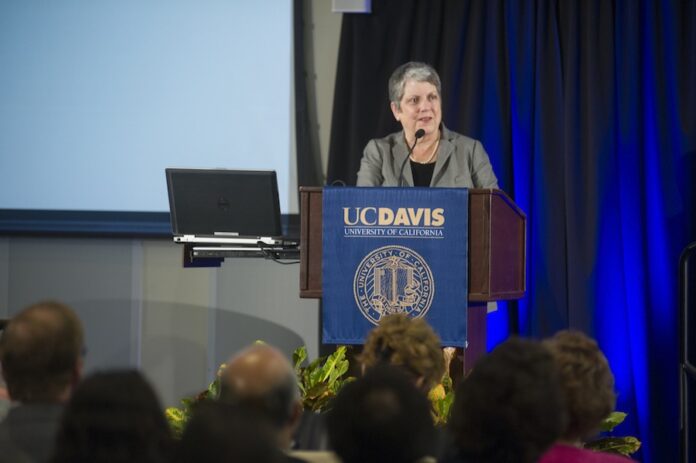Napolitano served seven years as UC President, during which she survived a cancer diagnosis
UC President Janet Napolitano announced to the UC Regents at their meeting today, Sept. 18, that she is stepping down from her role after a seven-year stint as the UC’s executive.
Napolitano, the UC’s 20th president, has led the UC since 2013 and will end her term on Aug. 1, 2020. Before coming to the UC, she was the head of the Department of Homeland Security from 2009 to 2013, served as the governor of Arizona from 2003 to 2009 and was Arizona’s attorney general from 1998 to 2003.
“My time at UC has been deeply gratifying and rewarding,” Napolitano said, according to a statement. “I have been honored and inspired every day to serve this institution alongside incredibly dedicated, passionate people. The decision was tough — and this moment, bittersweet — but the time is right.”
The statement the UC released highlighted some of Napolitano’s efforts during her tenure as UC President. These included increasing enrollment, stabilizing tuition and shaping the Deferred Action for Childhood Arrivals program, as well as expanding access to the UC for community college transfer students and addressing the basic needs crisis for students.
DACA was created under her leadership when she was the Secretary of the Department of Homeland Security. She has thus been one of the key leaders in attempts to stymie President Donald Trump’s efforts to end the program.
“Under Napolitano’s leadership, UC became the first university in September 2017 to sue the Department of Homeland Security for its rescission of DACA, a program that protects from deportation young undocumented immigrants brought to the U.S. as children,” the statement said. “The resulting preliminary injunctions by the courts have enabled many of UC’s undocumented students, along with Dreamers across the nation, to renew their DACA status and live and work in the United States; since January 2018 more than 500,000 DACA recipients have extended their authorizations.”
During her time at the UC, Napolitano also survived a cancer diagnosis, for which she was briefly hospitalized before returning to her duties. She stated that since her treatment for the disease in 2016 and 2017, her health has improved and her tests are clear. She added that her health was not a factor in her decision to step down and that the average tenure of a university president is around six years.
Former UC Board of Regents Chair George Kieffer praised Napolitano for her work over the past six years, saying that “the university is better off today than when Janet became president.”
During a press teleconference regarding her announcement, Napolitano was asked about her efforts to hold UC tuition flat.
“We were very grateful for the governor’s budget for the university this year,” Napolitano said. “His budget which was basically the budget adopted by the legislature, and increased funding for the university by almost 7%.”
She noted that over the previous six years, tuition has remained flat across the system for in-state undergraduates, except for one year that saw a roughly 2% increase.
In her final year as UC President, Napolitano has promised to continue working hard on the issues set out before her, which Kieffer called “an ambitious agenda.” This includes increasing degrees awarded by the university; closing education gaps, including those affecting low income families; continuing to support research; strengthening policies around sexual harrassment and sexual violence for students, faculty and staff; moving forward on making the UC carbon neutral and 100% reliant on renewable energy by 2025; improving student’s access to housing and, finally, improving access to basic needs, especially food security.
After leaving her role as UC President, Napolitano will take a sabbatical from the UC. She will then begin teaching at the Goldman School of Public Policy at UC Berkeley, where she is a tenured professor, in Fall of 2021. She has not yet decided on the topics her classes will focus on, noting her breadth of available expertise.
Napolitano did not rule out a future role in government.
“I have no intentions in those regards, but you never say never and I won’t say never,” Napolitano said. “But I think my intentions going forward are pretty clear.”
The search for a new UC President will begin soon under an appointed search committee. The composition of this search committee will be announced by the end of this week by UC Board of Regents Chair John Pérez.
The search committee will be influenced by various advisory committees. These advisors will represent the broad swath of the UC, with committees focused around students, faculty, staff and alumni. Each advisory committee will include members of the 10 UC campuses.
“Per policy, the search committee will include student, faculty and alumni representatives who will seek and incorporate input from the UC community and the public at large,” the statement said.
Written by: Kenton Goldsby — campus@theaggie.org










